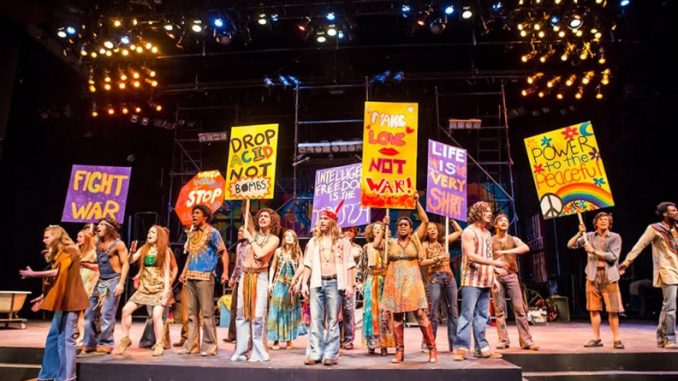
A tribe of flower children ran rampant all over Tomlinson Theater’s main stage, singing “Let the Sunshine In.”
The actors went up and down the aisles, shaking their messy hair and professing their sincere belief in the powers of peace, love and hippie-dom. Temple’s spring production of “Hair: The American Tribal Love-Rock Musical” debuted on March 26 to an almost full house. The audience clapped, sang and swayed along to the psychedelic tunes of the 1960s musical.
Director Brandon McShaffrey said it was not as simple as just recreating the Broadway hit.
McShaffrey, a freelance director and choreographer based in Philadelphia, has directed various shows in the area. He said directing “Hair” was “unlike any other musical [he has] directed,” because when rehearsals began, his script was almost blank. This was part of an effort to build the show from the ground up with the ensemble, known as the “tribe” in this production, he said.
For McShaffrey, it was important that the full cast work together to create a show that represented not only the traits of the free-spirited characters, but the personalities of the actors as well.
“It fell into my responsibility to assemble a tribe of young people who not only held the talents to perform the show, but were equally politically and socially minded,” McShaffrey said. He added that he made it clear being in “Hair” was about more than what he called “archetypal hippie behavior.”
Cameron Scot Slusser, a senior theater major, plays the character Claude. Having spent a bit of time working in both college and professional plays, Slusser said he was excited to be part of what he considers to be a show that changed his life.
“I feel as though I can speak for everyone [in the cast] when I say that ‘Hair’ has been more than memorizing lines and choreography,” Slusser said. “I left every rehearsal feeling refreshed, more alive and feeling that I needed to make a change in the world.”
Slusser and senior theater major Rachel Quinn, who plays the character Crissy, said the experimental and funky aesthetic attracted them to the show.
“There is magic in musical theater that is hard to find anywhere else,” Quinn said.
Quinn credited McShaffrey for giving the production a sense of community that encouraged a bond between the play and the student-actors.
“I believed in his vision for the show before the audition and I continue to believe in him and this vision every day,” Quinn. “Our entire tribe does.”
McShaffrey said he knew he wanted his cast to be as open as possible with one another. During rehearsals he would encourage meditation and paint-ins, as well as have regular group discussions about controversial topics. Matters ranging from race, gender, sexuality and religion were on the table, prompting the students to address their personal opinions as well as consider the perspectives of their radical counterparts from decades past.
One societal debate discussed was hair modification.
“[We discussed] all of our hair – head, armpits, pubic, legs, nose, et cetera – [and] what hair means in our various cultures and America’s war of hair,” McShaffrey said.
The messages of “Hair” go beyond sex, drugs and rock ‘n’ roll, McShaffrey said. The primary message is the need for a more loving world. He said the show stands the test of time after 46 years because the performance itself has a deeper significance.
Temple’s production of “Hair” will run until April 6.
Darragh Dandurand Friedman can be reached at darragh.friedman@temple.edu.


Be the first to comment